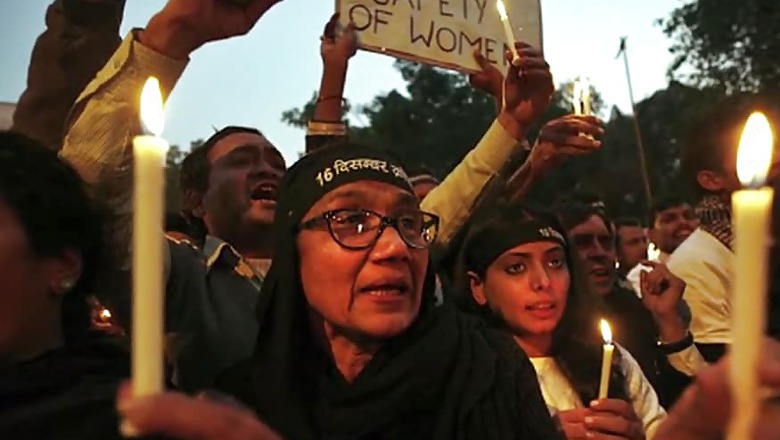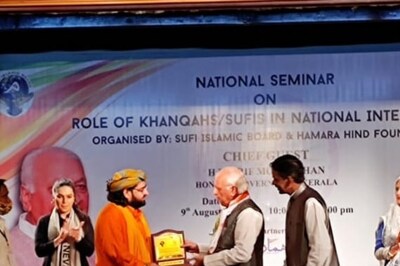
views
New Delhi: If there is one thing that has always been the usual recourse to justify death sentences, is questions like — how did the crime become a "rarest of the rare case" and how did "shake the collective conscience of the society".
No doubt, Nirbhaya was one of the very few cases of violence inflicted on a woman which not only led to protests on the streets and a conflict between public and police but also a realisation had dawned upon the public that women were indeed not safe.
There has not been many instances when a single case of rape and murder has led to significant legal changes and amendments, which ensured security to the future victims.
However, the delay in legal justice system cannot be avoided in this case. Though the trial court had delivered the verdict within a year of the incident, but the Supreme Court took close to four years with another year being taken up for the review petition. Next, the petitioners still have recourse to filing a curative petition if the verdict is not in their favour.
News18 here charts down the entire timeline of events that unfolded in this case:
December 16, 2012: A 23-year-old paramedic student and her male friend take a private bus home after watching English film "Life of Pi" at the Select City Walk Mall in Saket. The woman was brutally raped and beaten up by six men in the moving bus and thrown out of it near Mahipalpur along with her male friend. They are admitted to Delhi's Safdarjung Hospital the same night.
December 17: Delhi Police identify four men who raped and assaulted her -- bus driver Ram Singh, his brother Mukesh, Vinay Sharma and Pawan Gupta. Doctors say the woman has suffered grave internal injuries.
December 18: Ram Singh and three others are arrested. People come out on the streets to protest the gang-rape.
December 19: The woman undergoes a fifth surgery, with doctors removing most of her intestines.
December 21: The accused juvenile is nabbed from Anand Vihar bus terminal in Delhi. The government appoints a panel of physicians to ensure she receives best medical care. The woman's friend identifies Mukesh as one of the culprits. Police conduct raids in Haryana and Bihar to nab sixth accused, Akshay Thakur.
December 22: Akshay Thakur is arrested in Bihar and brought to Delhi. Victim records her statement before the SDM in hospital.
December 25: The woman's condition deteriorates.
December 26: She is flown to Singapore's Mount Elizabeth Hospital for advanced treatment.
December 29: The woman dies in Singapore due to organ failure.
January 2, 2013: The then Chief Justice of India Altamas Kabir inaugurates fast track court for speedy trial in sexual offence cases.
January 3: Police files charge-sheet against five adult accused for offences including murder, gang rape, attempt to murder, kidnapping, unnatural offences and dacoity.
January 17: Fast track court starts proceedings against five adult accused.
January 28: Juvenile Justice Board rules that sixth accused is a minor.
February 2: Five adult accused are charged with 13 offences including murder.
February 28: Juvenile Justice Board (JJB) frames rape, murder charges against the juvenile accused.
March 11: Ram Singh, the bus driver, is found hanging in his cell in Tihar jail.
March 21: Government approves new tougher anti-rape law to punish sex crimes, including death for repeat rape offenders.
July 5: Trial against juvenile concludes, the JJB (Juvenile Justice Board) reserves verdict for July 11.
July 11: The JJB holds the minor guilty of illegally confining and robbing a carpenter on December 16 night before the gang rape. It defers to July 25 its verdict in the gang-rape case.
July 25: JJB defers to August 5 its verdict after a PIL is filed in the Supreme Court seeking fresh interpretation of the term "juvenile".
August 19: JJB again defers verdict to August 31.
August 22: Supreme Court allows JJB to pronounce verdict in gang rape case.
August 31: JJB convicts the juvenile for gang rape and murder and awards three years term at a probation home.
August 22: Fast track court begins hearing of final arguments in trial against the four adult accused.
September 10: Court convicts Mukesh, Vinay, Akshay, Pawan of 13 offences including gang rape, unnatural offence and murder of the woman and attempt to murder her male friend.
September 13: Fast track court awards death to all four convicts. Trial court refers the case to Delhi High Court for confirmation of death sentence.
November 1: The Delhi High Court starts hearing the case on a daily basis.
January 3, 2014: The Delhi High Court reserves its verdict on confirming the death sentence and appeals of the four convicts.
March 13: The Delhi High Court upholds the death sentences awarded to the four convicts.
June 2: Two death row convicts move the Supreme Court against the Delhi High Court verdict.
July 14: The Supreme Court stays till further orders execution of death penalty of two of four convicts -- Vinay Sharma and Akshay Thakur.
December 18, 2015: Delhi High Court refuses to stay the release of the juvenile. He walks out of a correction home after spending three years.
April 3, 2016: Supreme Court begins hearing in the case.
July 11: Hearing begins with a change in Bench to Justices Dipak Misra, R. Banumathi and Ashok Bhushan.
August 2016: Vinay Sharma tries to commit suicide in Tihar Jail.
January 6, 2017: Supreme Court seeks mitigating circumstances from the accused.
March 27: Supreme Court reserves verdict after nearly a year of hearing the case.
May 5: SC upholds death penalty of four accused - Akshay Thakur, Vinay Sharma, Pawan Gupta and Mukesh Singh.
November 13, 2017: The three judge SC bench led by CJI Dipak Misra started hearing the review petition petition filed by Mukesh Singh.
January 2018: SC reserves verdict on the plea filed by Mukesh Singh for reconsideration
May 4, 2018: SC reserves verdict on the plea filed by the other three convicts
May 8, 2018: SC deadline expires on the written submissions to be filed on behalf of Akshay Thakur, Pawan Gupta and Vinay Singh
July 9, 2018: SC three judge bench to deliver verdict on the fate of all the convicts in the Nirbhaya rape and murder case. Since this is a review plea, should the judges reject it and uphold the death penalty, the last resort of filing a curative petition will still lie with the accused.




















Comments
0 comment